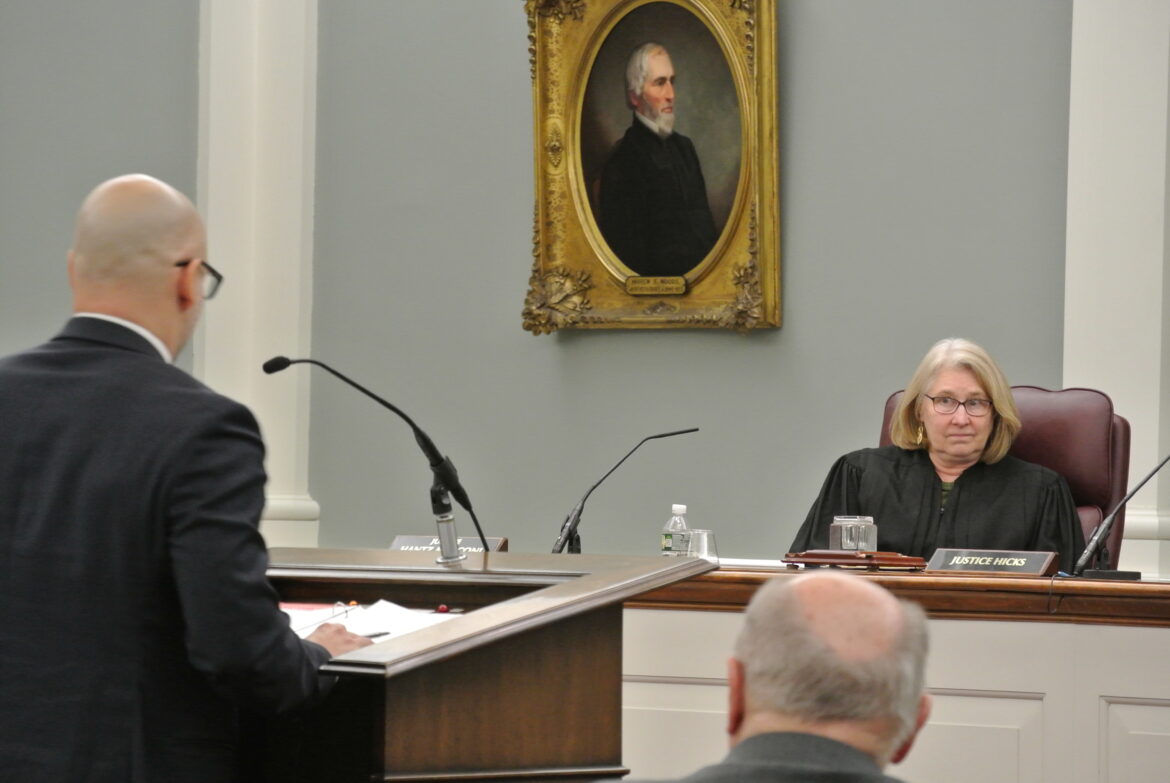
By DAMIEN FISHER, InDepthNH.org
CONCORD — Whatever is in the Claremont Police Department’s internal affairs records that state Rep. Jon Stone is trying to hide from the public, it’s bad, his lawyer told the New Hampshire Supreme Court on Tuesday.
“It will embarrass and humiliate my client, and it will embarrass and humiliate multiple people in the city of Claremont,” attorney Peter DeCato said.
Stone has been blocking attempts by this reporter to have his police personnel records released under the state’s right-to-know law for more than three years.
Tuesday’s appeal hearing at the state Supreme Court is the final battle to keep those records under wraps.
Stone is a Republican representing Claremont in the House. He was a long-time elected city councilor as well, but lost in his reelection bid last week to newcomer Jonathan Hayden. Stone asked for a recount after losing by a razor thin margin of 247 to 241. Tuesday’s recount resulted in an identical outcome.
DeCato and Stone contend the five internal affairs records in question should not be released as they are covered under the terms of an agreement negotiated in 2006 when Stone was still a Claremont police officer. The full details of what’s in that agreement are unknown, but DeCato told Chief Justice Gordon MacDonald and Associate Justices James Bassett, Patrick Donovan, and Anna Barbara Hantz Marconi the deal resulted in Stone resigning from the department in exchange for the records staying secret.
“The city of Claremont got something, and Mr. Stone got something,” DeCato said.
DeCato repeatedly told the justices none of the allegations in the internal affairs reports were ever sustained. However, based on DeCato’s statements, it seems they were not fully investigated as part of the negotiated agreement.
The city was prepared to make unspecified accusations against Stone public in some manner, according to DeCato, and the city had 30 witnesses ready to testify against Stone. Instead, after negotiations that included the police union, Stone and the department agreed to a parting of the ways. That agreement now ought to override the state’s right-to-know law, DeCato said.
“I want to enforce the agreement, I think it should be enforced,” DeCato said.
One of the problems for DeCato and Stone is the fact the city stuck to the agreement and removed five reports from Stone’s file, but then placed copies into the department’s internal affairs repository. The city was prepared to make the reports from the internal affairs records available when Stone first filed an injunction.
Gilles Bissonnette, the legal director at New Hampshire American Civil Liberties Union, argued Stone’s agreement from 2006 does not stand up against the public’s right to information about public servants and how their governments operate.
The original agreement between Stone and the city was an attempted end run around the rights of the people, he said.
“The whole point here of this contract was to limit public disclosure,” Bissonnette said.
New Hampshire’s Supreme Court has shown it is inclined to side with the public when it comes to transparency, especially with police officers. In two 2020 decisions, the Court ruled police personnel and discipline records are subject to RSA 91A, the state’s right-to-know law.
Given the current legal environment, MacDonald seemed to suggest to DeCato the 2006 agreement isn’t worth the paper it was written on since it can now only be enforced by violating 91A.
“The question is whether the contract is enforceable or not, given that it violates public policy,” MacDonald said.
But Hantz Marconi appeared skeptical that the agreement to hide the record, which was considered legal in 2006, can now be ignored thanks to the 2020 Supreme Court decisions. She called it retroactive redefinition of what is a public document, and what is a confidential document.
But Bissonnette countered that no one in 2006 thought the agreement was ironclad against the law. The agreement includes stipulations that it can be voided by an order of a court or other higher authority. Further, all appellate decisions are retroactive under common legal practice, Bissonnette said.
“There’s no blanket confidentiality,” Bissonnette said. “They carved out exemptions in the agreement understanding that the law can change over time.”
Tuesday’s hearing is an appeal of Sullivan Superior Court Judge Martin Honigberg’s order to the city to release the documents pertaining to Stone. Those include records of eight written and verbal reprimands as well as the five internal affairs reports. There are another two reports in matters Honigberg deemed confidential and not subject to disclosure.
Stone was a member of the Claremont Police Department’s Drug Investigation Unit around the time of his termination. In 2006, a protective order was filed against him by a city woman, though it was withdrawn a few weeks later. The records of that order are not available through the court.
After Stone left the department, then Police Chief Alex Scott would subsequently file a Form B with the New Hampshire Police Standards and Training Council informing the council Stone was terminated for reasons of moral turpitude. The PSTC has told this reporter it no longer has the records pertaining to Stone’s certification, but he has not been a certified police officer in New Hampshire since around the time of his termination from the city.






